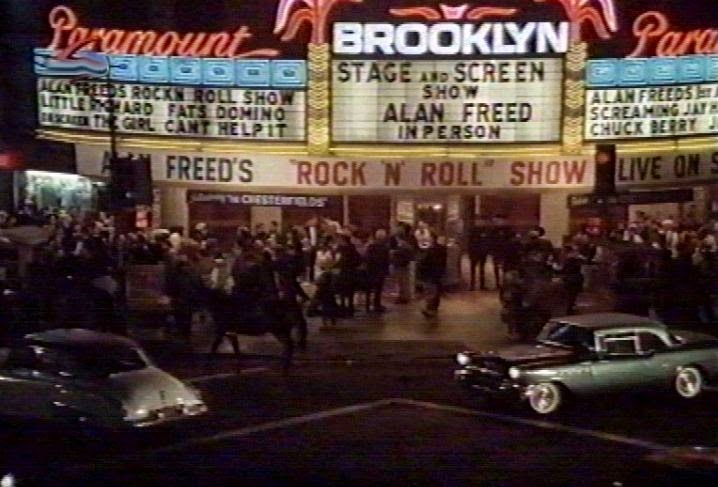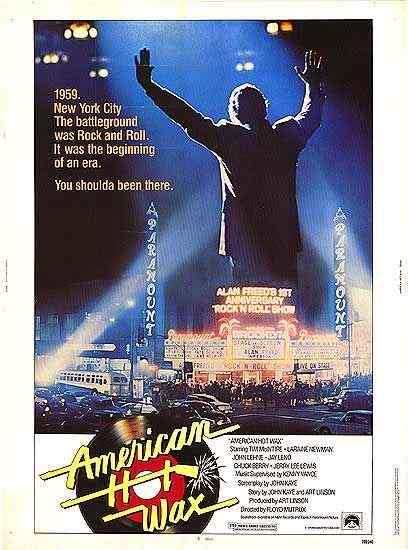 |
| Written by Generoso Fierro |
Over the last nineteen years of my radio show, I have always ended with the phrase, “And in the immortal words of the late, great Alan Freed: This is not goodbye, it is just goodnight.” As a young man growing up Philly, obsessed with radio as many of us were, I was thrilled in 1978 when a biopic was made on the infamous Cleveland disc jockey who coined the term, “rock and roll,” Alan Freed.
A year earlier on a local UHF station I had seen the 1956 film, “Rock, Rock, Rock” that starred Freed, which encouraged me to go to my local library to read about Freed and his relationships with the artists he nurtured, the blacklisted music that he rebelliously played on air, and the eventual “payola” scandal that destroyed his career.
So, even as a boy of ten, there was a lot riding on American Hot Wax in my mind, and I asked my dad to take me to see it in a downtown theater.
Before my review of the film, I should paint a more accurate picture of the 1970s for me as I mostly remember local radio, television, and film as being obsessed with the 1950s. Philly had been the home of so many doo-wop groups that, even though the local FM airwaves were blessed with the sounds of Philadelphia International disco, the AM dial was firmly entrenched with the vocal harmonies of local groups such as The Penguins, The Moonglows, and The Five Satins, not to mention that young men were still vocal harmonizing these tunes on street corners. George Lucas’ nostalgic American Graffiti was getting regular screenings on television, Happy Days was a huge hit on ABC, and my sister, like so many of her age, loved Grease. I had indeed fallen into the nostalgia craze for a decade that I had never been a part of, which means that I was not privy to negatives of that time either, and most likely for that reason I was beyond thrilled seeing American Hot Wax when it was released.
To be able to see the likes of Chuck Berry, Jerry Lee Lewis, and Screamin’ Jay Hawkins on screen in the days prior to our family being able to afford a VHS player was too mind-altering and to get some glimpse into that world where many of the songs I knew and loved were created was amazing to me, and regardless of where this review goes, I am so glad that those moments were put on film, especially given that Screamin’ Jay is no longer with us.
Over thirty five years later, I sat down and re-watched this film directed by Floyd Mutrux, and immediately noticed that it is shot in that same static, one camera style, similar to that of The Buddy Holly Story, which came out later that year, and frankly almost every television movie of that era. It’s amazing to me that a film so much about a man as it is about nostalgia would not go to the extra level of adding a visual technique to entrench it into its time period. The film immediately creates a feeling of frenzy and genuine excitement around Freed, as he goes through his hectic days leading up to the last live “rock and roll” show that he would produce in New York City. The actual Freed had been arrested in Boston months earlier for inciting a riot after he took the microphone during some unrest at a show he put on and said, “The police don’t want you to have fun.” American Hot Wax does make it abundantly clear that the establishment was not happy with Freed’s ability to encourage white teens to listen to sexually charged black music.
 |
| Tim McIntire As Alan Freed |
Tim McIntire does a fine job as Freed, playing him as written in history as a charismatic, intense man, who genuinely loved music and was excited to promote it, even spending his personal time with artists and signing some groups right off the street in front of WABC. Two actors whom I did not recall from 1978 and who were always at Freed’s side were his loyal secretary Sheryl, played by a less painfully annoying but adorable, Fran Drescher, and his driver, “Mookie” played by the usually unfunny Jay Leno. A real surprise in the film is the performance by then, SNL regular, Laraine Newman, who does a great job playing the Carole King-esque Louise, an upcoming teenage songwriter who like King, wants to write for the young groups and is more than happy to stay out of the spotlight.
What is of course the real star of the film, is the very generous soundtrack, which in these days of over-inflated clearance rates for music will most assuredly never happen again. Not only are members of the cast covering many of the greatest songs of that era, but also there are the actual tracks from the 1950s that Freed played on the air. If there was ever a nostalgic moment that existed for me during this viewing of American Hot Wax was hearing these amazing cuts and knowing that the days of unlimited original music in film are all but gone.
Though the music is sensational (but not necessarily accurate at all times) the trade-off that American Hot Wax makes in terms of sacrificing narrative for a frenzied atmosphere is just too intense, and there is very little that glues this film together as far as story. For what the film captures as far as the intense hatred the establishment had for rock and roll, there is as little to take away about the actual life of Freed. There is a small moment of insight when his family painfully rejects Freed during a phone call back to his hometown of Akron, and another moment when Freed is denied the purchase of his dream home after he arrives with a group of racially mixed teens, but that’s about all you get.
This failure in creating a whole character in Freed undermines what should be the emotional climax of the film, the first anniversary rock and roll show at the Brooklyn Paramount where Jerry Lee Lewis and Chuck Berry perform. The film, though not a total mess, was not well reviewed and did not do well at the box office when released in 1978.
Later in 1978, still riding on the heels of the 1950s nostalgia, was the sensational biopic, The Buddy Holly Story, on the legendary singer, songwriter, and producer which garnered a well-deserved Academy Award nomination for Gary Busey in the titular role.
For me, The Buddy Holly Story is a kind of correction of the mistakes of American Hot Wax, as it never loses it’s main character while being as heartfelt and well-constructed as it is nostalgic.










































































































2 Comments